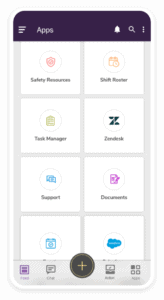


The physical location where collection of data or information takes place is called the ‘field.’
It could vary depending on the domain of work.
It can range from a retail store, a mall, a school, or a particular customer segment.
Irrespective of where it is being collected, field data is extremely important information available to a business.
Field data gives business owners and decision makers the insights needed to craft strategies and make informed decisions.
Leveraging this data saves resources and streamlines operations.
Some of the industries that benefit from field data collection are engineering, energy, construction, telecommunications, and so on – all industries with a large section of deskless workers.
Field data collection observes behaviours of people in their natural environment.
Researchers interviewing consumers in a retail store to understand their purchase patterns is an example of field research.
Sociologists interviewing specific sections of society, whether it is socio-economically specific or ethnicity based, is a form of field research.
Insurance companies collect data about houses, the material used in construction and so on, in order to better design their products.
Field data collection is a tedious and complex process.
The process is even more cumbersome if the business uses outdated methods of data collection.
Many companies are still using the long-winded paper based methods of data collection.
Other challenges in field data collection include weather fluctuations, language differences, training employees, and so on.
Some businesses use WhatsApp or some basic apps for data collection, which still don’t make the cut.
The issue with these traditional modes is that transferring that data to the workplace network becomes tricky, and information could get lost in translation.
Some issues here could be lost information, hard to decipher handwriting, inaccurate records, and so on.
All these issues in traditional field data collection make the need to go paperless even more pressing and immediate.
Manual data collection is not dependable or uniform. It is subject to human error and data loss.
It is also extremely time consuming.
Moreover, the process of collecting data from field agents and consolidating large volumes of data is a painful task.
The task of transforming that data into a structure that can be used and analyzed is even more tedious.
New and emerging technology is the best way to tackle this menace.
It saves a lot of time and effort, reduces error, and streamlines the entire data collection process, making it translatable and transferable more easily.
Technology ensures faster data collection thus helping businesses analyse ground realities and take decisions faster and better.
Collecting data using mobile forms trumps the paper based manual methods, in that the information can be accessed in real time.
Accuracy is the biggest takeaway in digital field data collection.
Good mobile forms for data collection help you tackle complex issues in the process and should be able to collect any type of data in multiple formats.
It should help with processing and analyzing large volumes of data as well.
1. Groupe.io (Andriod, iOS and Web)
Groupe.io is a mobile-first employee app specifically designed for frontline, deskless and distributed workers.
While the platform has features catering to internal communications, team collaboration and employee engagement, it also comes with powerful process automation tools and mobile forms.
Field data collection comes under the purview of frontline workers.
Groupe’s mobile forms feature lets you instantly convert paper forms to digital forms, helping you accelerate the process of going paperless and cutting costs.
The platform lets you customize your forms with the form builder’s drag and drop functionality.
The provision of e-signatures lets you sign documents and effect approvals digitally, from anywhere, anytime.
This helps save time and overcome bottlenecks in workflows.
The app comes with a QR code and barcode scanner.
This helps users capture specific data faster.
The solution also has provisions for photo capture, document upload and file sharing, giving executives a variety of options to capture data from the field.
Data can be easily transferred to the workplace for analysis through a single access point feature.
The advantage with Groupe.io is that it is a value for money product that is easy to use, in that it is designed similar to consumer apps.
The product onboards users without corporate email ids as well. It is a secure and GDPR and HIPAA compliant product.
2. JotForms Mobile (Android, iOS and Web)
JotForms is a popular online form builder.
The app allows you to accept payments in mobile forms.
JotForms Mobile facilitates data collection in multiple formats like electronic signatures, barcodes, voice recordings and more.
This data can be consolidated and processed all in a single platform.
The app functions offline and pdf copies of data and information can easily be shared.
You can also use multiple downloadable templates.
There are more than 30 payment gateway options to add to the form.
Completed forms can be shared as urls, downloaded as pdfs or linked to third party platforms.
Site surveys, market research, and more, JotForm can handle the intricacies and the volumes involved in whatever data collection project being undertaken.
3. Magpi (Android and iOS)
Magpi lets people create mobile forms for data collection, and functions in both online and offline mode. It is handy in the sense that it lets you collect data from focus groups that aren’t that digitally savvy.
The surveys are low cost and swift, and easily translatable and transferable for research purposes.
The app has a voice-first feature called IVR (interactive voice response).
This feature allows people to respond to forms vocally.
Other features of the platform are auto updates, GPS stamping and mobile surveys.
The software allows for integration of workflows through which respondent data can be extracted easily.
Advantages of Magpi are reduced errors, going paperless and quick response times.
4. Fulcrum (Web, iOS, Android)
Fulcrum is a mobile data collection platform that helps you record data, click pictures and has advanced geolocation through which you can tag GPS locations.
It is useful for businesses in construction and transportation domain.
You can design your own form or choose from a variety of inbuilt templates.
Fulcrum provides you the option of collecting a wide range of data ranging from audio files, videos, barcodes and signatures.
You can export your form in multiple formats ranging from PDFs, .csv to Excel.
5. KoboToolbox (Android, Web)
This mobile-first tool is used in service related units primarily in philanthropic organizations.
Data collection can be done on the browser or app called KoboCollect.
This form also allows for both online and offline data collection. The platform is open source.
It was designed in Harvard.
In Conclusion
Adopting mobile forms for data collection and moving away from traditional pen and paper mode poses multiple advantages.
The first benefit of going paperless is in terms of cost savings – both monetarily and environmentally.
The others, as mentioned earlier, are reducing manual error, time savings, easily translatable to research teams for analysis, accuracy, scalability and more.
